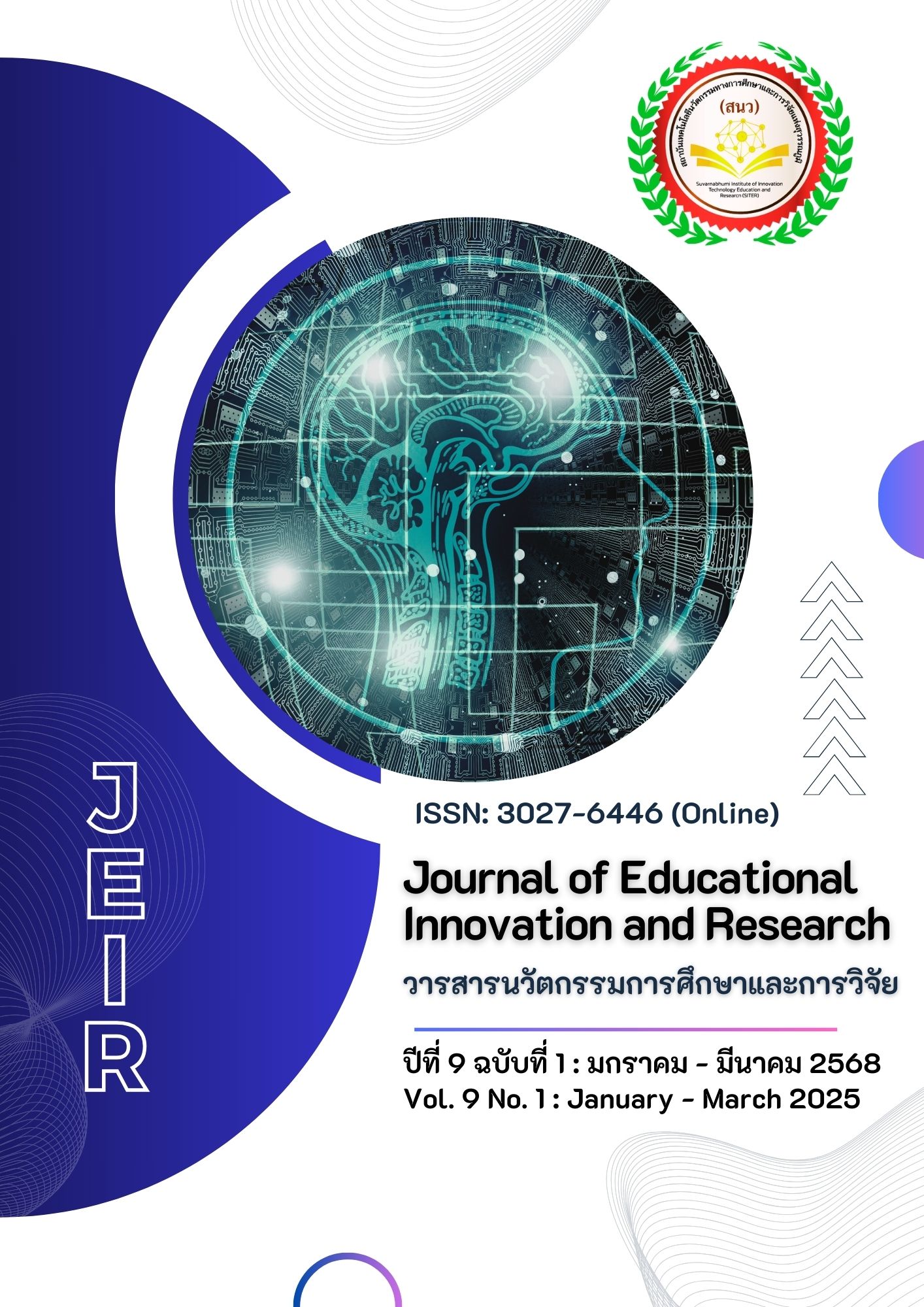ความสัมพันธ์ระหว่างการเรียนรู้ด้วยเกมและการส่งเสริมทักษะการคิด เชิงนวัตกรรมในการบริหารจัดการธุรกิจ
Main Article Content
บทคัดย่อ
บทความนี้มีวัตถุประสงค์ 1) เพื่อพัฒนารูปแบบการเรียนรู้ด้วยเกมเพื่อส่งเสริมทักษะการคิดเชิงนวัตกรรมในการบริหารจัดการธุรกิจ 2) เพื่อศึกษาผลการใช้รูปแบบการเรียนรู้ด้วยเกมในการส่งเสริมทักษะการคิดเชิงนวัตกรรมในการบริหารจัดการธุรกิจ และ 3) เพื่อศึกษาความสัมพันธ์ของความรู้ในการออกแบบนวัตกรรมและทักษะการคิดเชิงนวัตกรรมหลังเรียนด้วยรูปแบบการเรียนรู้ด้วยเกม การวิจัยเป็นการวิจัยเชิงปริมาณ กลุ่มตัวอย่างในการวิจัยคือ นักศึกษาระดับปริญญาตรี ชั้นปีที่ 4 สาขาวิชาการท่องเที่ยวและการโรงแรม จำนวน 38 คน ใช้วิธีคัดเลือกแบบเจาะจง เครื่องมือที่ใช้ในการวิจัย คือ 1) แบบประเมินทักษะการคิดเชิงนวัตกรรม และ 2) แบบทดสอบความรู้ในการออกแบบนวัตกรรม วิเคราะห์ข้อมูลด้วยสถิติเชิงพรรณนา และสถิติแบบไม่อิงพารามิเตอร์ โดยใช้สถิติ Wilcoxon Signed-Rank Test และสัมประสิทธิ์สหสัมพันธ์แบบสเปียร์แมน
ผลการวิจัยพบว่า 1) รูปแบบที่พัฒนาขึ้นมี 5 ขั้นตอน ได้แก่ 1) กำหนดเป้าหมายที่ท้าทาย 2) ระดมสมอง 3) สร้างสรรค์ผลงาน 4) นำเสนอผลงาน และ 5) ประเมินผล ผลการประเมินความเหมาะสมของรูปแบบการเรียนรู้ด้วยเกม ด้วยวิธี CVR เท่ากับ 1.00 แสดงว่ารูปแบบการเรียนรู้มีความเหมาะสม 2) ทักษะการคิดเชิงนวัตกรรมของผู้เรียนหลังเรียนสูงกว่าก่อนเรียน อย่างมีนัยสำคัญทางสถิติที่ระดับ .05 และ 3) ความสัมพันธ์ระหว่างความรู้และทักษะการคิดเชิงนวัตกรรมของผู้เรียนไม่มีความสัมพันธ์กัน
องค์ความรู้จากงานวิจัยนี้พบว่ารูปแบบการเรียนรู้ด้วยเกมประกอบโดยการสร้างสภาพแวดล้อมการเรียนรู้แบบเกมมิฟิเคชัน การจัดกิจกรรมและประเมินผลการเรียนรู้ด้วยเกมเป็นฐาน สามารถส่งเสริมทักษะการคิดเชิงนวัตกรรม และผู้เรียนสามารถสร้างนวัตกรรมในการบริหารจัดการธุรกิจได้
Article Details

อนุญาตภายใต้เงื่อนไข Creative Commons Attribution-NonCommercial-NoDerivatives 4.0 International License.
เอกสารอ้างอิง
Barr, M. (2019). Graduate skills and game-based learning: Using video games for employability in higher education. Springer Nature.
Cohen, J. (1988). Statistical Power Analysis for the Behavioral Sciences (2nd ed.). Lawrence Erlbaum Associates.
Deterding, S., Dixon, D., Khaled, R., & Nacke, L. (2011). From game design elements to gamefulness: defining" gamification". Proceedings of the 15th International Academic MindTrek Conference: Envisioning Future Media Environments. ACM.
Dyer, J., Gregersen, H., & Christensen, C. M. (2019). The Innovator's DNA, Updated, with a New Preface: Mastering the Five Skills of Disruptive Innovators. Harvard Business Press.
El-Said, M., & Mansour, S. (2008). Game based learning creating a triangle of success: play, interact and learn. International Journal Intelligent Games & Simulation, 5(2), 26-32.
Franco, F. P., & DeLuca, A.D. (2019). Learning through action: creating and implementing a strategy game to foster innovative thinking in higher education. Simulation & Gaming, 50(1), 23-43.
Ichsan, I. Z., Rahmayanti, H., Purwanto, A., Sigit, D. V., Kurniawan, E., Tanjung, A., & Singh, C. K. S. (2021). Thinking level in education: a complete revision of Anderson’s taxonomy. Pedagogika/Pedagogy, 141(1), 53-78.
Hamari, J., Koivisto, J., & Sarsa, H. (2014). Does gamification work? A literature review of empirical studies on gamification. Proceedings of the 47th Hawaii International Conference on System Sciences (HICSS), 3025–3034.
Harika, A., Sunil Kumar, M., Anantha Natarajan, V., & Kallam, S. (2021). Business process reengineering: Issues and challenges. In S. M. Sameer, & S. Ajitha (Eds.), Proceedings of Second International Conference on Smart Energy and Communication: ICSEC 2020 (pp. 363–382). Springer Singapore.
Johnson, L., Adams Becker, S., Estrada, V., & Freeman, A. (2016). NMC Horizon Report: 2016 Higher Education Edition. The New Media Consortium.
Namburi, S. (2019). Innovation and Administration. The Journal of Research and Academics, 2, 121-134.
National Statistical Office. (2021). Thai Labour Situation Report 2021. National Statistical Office.
Office of the National Economic and Social Development Council. (2018). The 20 Year National Strategy (2018–2037). NESDC.
Pan, Y. & Ke, F. (2023). Effects of game-based learning supports on students’ math performance and perceived game flow. Educational technology research and development, 71(2), 459-479.
Puspitaningrum, D. A., Fitriyah, C. Z., Nurdianasari, N., Finali, Z., & Ningsih, Y.F. (2019). Educative game tools with origami media for increasing creativity of class children in elementary school. International Journal of Scientific & Technology Research, 8, 1923-1925.
Sukavejworakit, N. (2024). Management of Learning Using Game as a Basis That Has an Effect on the Academic Achievement of Students in the Life Skills Subject. Journal of Political Science Suan Sunandha Rajabhat University, 7(1), 30-43.
Suksawang, S. (2021, June 24). Design Thinking: Organizational innovation development tools. Sasimasuk. https://www.sasimasuk.com/16810879/design-thinking Design.
Werbach, K. & Hunter, D. (2020). For the Win, Revised and Updated Edition: The Power of Gamification and Game Thinking in Business, Education, Government, and Social Impact. University of Pennsylvania Press.


